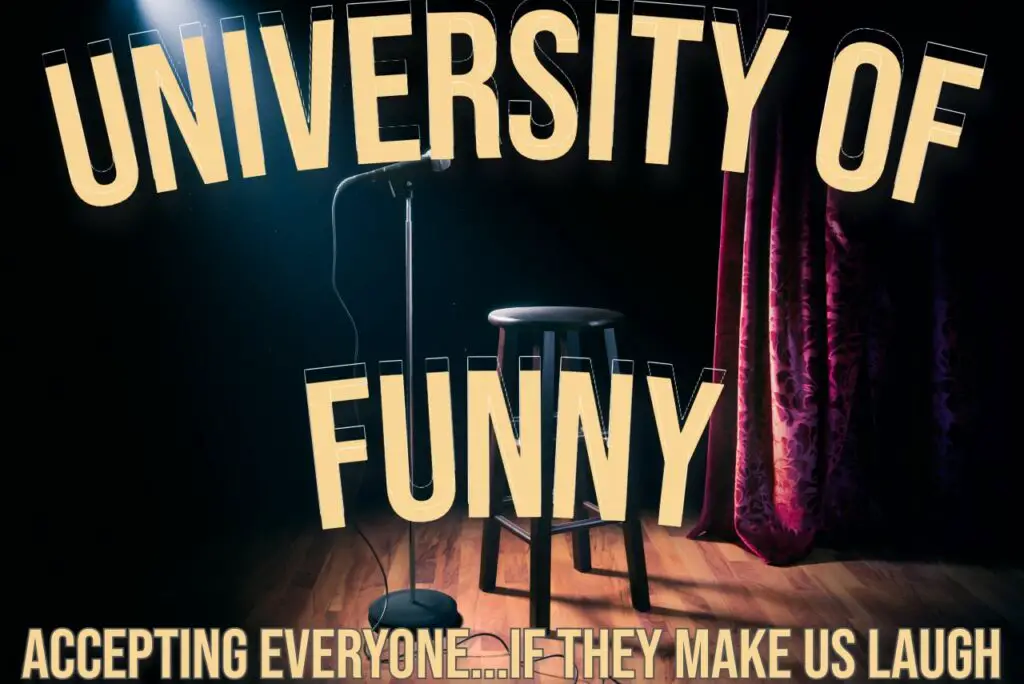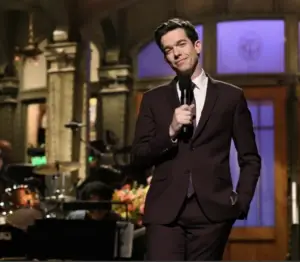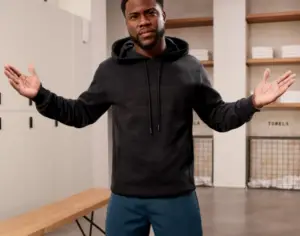The world loves comedians. They crack us up, make us feel good and can even help us recover from a bad day. There’s just one problem: If you want to become a famous comedian yourself one day, where do you go to learn the craft?

How do you become the type of stand-up comedian people pay money to see?
And how can you become that hilarious person in just a few short months or years?
Do they even offer comedy classes or workshops?
These are some of the questions we explored while researching schools offering degrees and certificates in comedic arts.
Comedy is a unique art form that has been around for centuries, bringing joy and laughter to audiences all over the world. As the popularity of comedy continues to grow, so does the number of aspiring comedians seeking to make it in this competitive industry. To help them achieve their goals, many have turned to comedy schools.
Contents
Definition of Comedy Schools
Comedy schools are institutions that offer training in the art of comedy. They range from standalone institutions such as Chicago’s famed Second City or The Groundlings in Los Angeles, to classes offered at community colleges or improvisation theaters. The goal of these schools is to provide aspiring comedians with the skills and techniques necessary to succeed on stage.
The Debate on Whether Funny is Teachable or Not
There has been a long-standing debate among comedians, educators, and researchers about whether funny can be taught or if it is an innate ability. While some argue that humor is a natural talent that cannot be taught, others contend that anyone can learn how to be funny with the right training.
Those who argue against teachability often cite examples like Robin Williams and Eddie Murphy as evidence that natural talent cannot be replicated through training. Meanwhile, those who believe in teachability point out successful comedians like Jerry Seinfeld and Ellen DeGeneres, both of whom honed their skills through years of practice and mentorship.
Purpose of the Study
The purpose of this study is to explore whether funny can indeed be taught by examining the experiences of successful comedians who attended comedy schools. By analyzing their journeys and success stories, we hope to shed light on both sides of this debate and provide aspiring comedians with insights into how they can improve their craft.
Throughout this article, we will examine the history and evolution of comedy schools, the arguments for and against teachability, and specific case studies of successful comedians who attended comedy schools. Our goal is to provide a comprehensive analysis of whether funny is indeed teachable or not, and what implications this may have for those seeking to break into the world of comedy.
Background Information
Comedy schools have been around for a long time, but they have evolved significantly over the years. In the early days, comedy schools were rare, and those who wanted to become comedians had to learn through trial and error.
However, with the rise of stand-up comedy in the 1970s, comedy schools began to emerge. One of the first comedy schools was The Comedy Workshop in Houston, Texas.
Founded by comedian Richard Pryor in 1963, it was a place where aspiring comedians could hone their skills and get feedback from peers and instructors. Other comedy schools soon followed suit.
Today, there are dozens of comedy schools across the United States that offer programs for aspiring comedians at all levels. Most programs are run by experienced comedians who teach students everything from joke writing to stage presence.
History of Comedy Schools

As mentioned earlier, The Comedy Workshop was one of the earliest examples of a formalized school for comedians. However, it wasn’t until the 1980s that comedy schools really took off as a viable option for those looking to break into stand-up. In 1984, Los Angeles-based comedian Judy Carter founded The Comedy Store Players School of Improv.
It quickly became one of the most popular options for aspiring comedians due in part to its association with The Comedy Store – one of the most famous venues for stand-up in America. Over time, other well-known comedians founded their own schools or workshops including Chicago’s Improv Olympic Training Center (iO) – founded by Del Close and Charna Halpern in 1981 – and The Upright Citizens Brigade Theatre (UCB), which was started by Amy Poehler and other members of her improv troupe in New York City.
Famous Comedians Who Have Attended Comedy Schools
There are many famous comedians who have attended comedy schools over the years. Some of them credit their time in these programs with helping them develop the skills and confidence they needed to succeed.
For example, John Mulaney – one of the most popular comedians working today – attended Chicago’s Improv Olympic Training Center (iO) before landing a job as a writer on Saturday Night Live. Amy Schumer also studied at a comedy school – the William Esper Studio in New York City – before becoming one of the most successful female comedians in history.
Other famous comedians who have attended comedy schools include Kevin Hart, Tiffany Haddish, and Jim Gaffigan. In each case, these performers credit their time in these programs with helping them develop their skills and find success on stage and screen.
The Teachability of Funny
Arguments for the Teachability of Funny
Many people believe that being funny is a natural talent and cannot be taught. However, the success stories of many comedians who have attended comedy schools suggest otherwise. Comedy schools offer structured programs that teach techniques and skills to create humor and engage an audience.
One technique taught in comedy schools is how to find humor in unexpected places. Comedians learn how to identify their own unique perspective on everyday situations or topics, then use it to create comedic material.
Another skill taught is comedic timing – when to pause, speed up or slow down delivery in order to get maximum laughs. Comedy students also practice generating material regularly through writing exercises and brainstorming sessions.
This regular practice helps develop their creativity, as well as build a bank of jokes that can be used on stage later. Feedback from instructors and peers also plays a crucial role in teaching funny.
Instructors provide constructive criticism on joke structure, timing, delivery and material selection. Similarly, peers provide feedback with different perspectives since they come from various backgrounds which can ultimately improve an artist’s set.
Arguments Against the Teachability of Funny
Despite these arguments for the teachability of funny, some still argue against it. They say that natural talent and innate humor are necessary for someone to become successful in comedy.
For example, some comedians might argue that their funniest jokes come from experiences or personalities they were born with rather than what they learned at a school. Moreover, personal experiences & perspectives are essential elements when creating jokes which makes everyone’s journey subjective; from upbringing experiences (i.e., cultural background), social status (i.e., living conditions) & even trauma (i.e., emotional pain).
These elements are crucial because they help comedians connect with audiences by making jokes about shared realities While there may be arguments against the teachability of funny, the evidence suggests that it is possible for people to learn how to be funny.
Comedy schools provide a structured environment for students to learn techniques, practice generating material, and receive feedback. And while natural talent and personal experiences can aid in the creation of comedic material, with dedication and practice, anyone can learn to be funny.
Case Studies: Successful Comedians Who Attended Comedy Schools
Analysis of specific comedians’ journeys to success after attending a comedy school
Despite the ongoing debate about the teachability of funny, many comedians have achieved remarkable success after attending comedy schools. Here, we will analyze the journeys of four prominent comedians who attended different comedy schools and assess the role that these institutions played in their careers.
John Mulaney – Chicago’s Improv Olympic Training Center

John Mulaney is a stand-up comedian, actor, and writer known for his work on Saturday Night Live and his Netflix specials. But before he became a household name, he honed his craft at Chicago’s Improv Olympic Training Center. There, he learned improve techniques and developed his unique brand of storytelling humor that has become his signature style.
Mulaney credits much of his success to the training he received at this institution. He has described it as “a great place for people who want to do sketch or improv or stand-up.” The center provided him with a supportive community where he could experiment with new material and receive constructive feedback from experienced comedians.
Amy Schumer – William Esper Studio in New York City
Amy Schumer is another comedian who has achieved immense popularity thanks to her irreverent humor and sharp wit. She studied acting at the William Esper Studio in New York City, where she learned how to tap into her emotions and use them to fuel her comedy.
The studio’s method acting approach helped Schumer develop a range of characters that she later incorporated into her stand-up routines. She has spoken highly of the school’s emphasis on authenticity and vulnerability as key components of comedy.
Kevin Hart – Community College in Philadelphia

Kevin Hart is one of the most successful comedians working today, with a net worth estimated at over $200 million. But before he became a household name, he was just a struggling comic trying to make ends meet in Philadelphia. Hart enrolled in a community college where he took public speaking and theater classes.
He credits these courses with giving him the confidence to pursue his dreams and develop his unique style of humor. In particular, he cites the public speaking class as having a major impact on his career: “It helped me find my voice as a comedian,” he said.
Tiffany Haddish – Laugh Factory Comedy Camp in Los Angeles
Tiffany Haddish is an actress and comedian known for her roles in films like Girls Trip and The Last Black Unicorn. She got her start at the Laugh Factory Comedy Camp in Los Angeles, where she learned how to write jokes and perform stand-up comedy.
The camp provided Haddish with valuable feedback from experienced comedians, as well as opportunities to perform at open mics and other events. She has credited the camp with helping her develop her stage presence and refine her material.
Conclusion
After analyzing the case studies of successful comedians who attended comedy schools, it is clear that funny can be taught to a certain extent. While natural talent and innate humor may play a role in comedic success, the techniques and skills taught in comedy schools can greatly improve a comedian’s ability to consistently deliver laughs. John Mulaney’s success after attending Chicago’s Improv Olympic Training Center is a testament to this.
He honed his skills through practice and repetition, as well as feedback from instructors and peers. Similarly, Amy Schumer’s attendance at William Esper Studio in New York City allowed her to develop her comedic voice and style while learning how to craft effective jokes.
However, it is important to note that attending a comedy school does not guarantee success in the industry. Practice outside of the classroom and personal experiences also play a significant role in shaping a comedian’s career.
Summary of Findings from Case Studies
The case studies analyzed in this study demonstrate that attending a comedy school can be beneficial for aspiring comedians looking to improve their craft. The techniques and skills taught in these schools can provide valuable tools for crafting effective jokes and delivering them with confidence. John Mulaney’s experience at Chicago’s Improv Olympic Training Center showcased how practice and repetition can lead to success on stage.
Through his dedication to honing his skills, he was able to become one of the most successful comedians of his generation. Similarly, Amy Schumer’s attendance at William Esper Studio helped her develop her unique comedic voice while also learning important techniques for joke writing.
This allowed her career to take off quickly after graduation. While each comedian had their own unique journey towards success, attending comedy schools allowed them all to sharpen their skills and find their place within the industry.
The Final Verdict on Whether Funny Is Teachable or Not
Based on the findings from this study, it is clear that while natural talent and innate humor may play a role in comedic success, funny can be taught to a certain extent. Attending a comedy school can provide aspiring comedians with valuable tools and techniques for crafting effective jokes and delivering them with confidence.
However, it is important to note that attending a comedy school does not guarantee success in the industry. Practice outside of the classroom and personal experiences also play a significant role in shaping a comedian’s career.
Ultimately, whether funny is teachable or not may still be up for debate. However, attending a comedy school can certainly help aspiring comedians improve their skills and increase their chances of success within the industry.
Implications for Aspiring Comedians, Educators, and Researchers
The findings from this study have important implications for aspiring comedians looking to break into the industry. Attending a comedy school can provide valuable tools and techniques for improving one’s craft and increasing their chances of success.
For educators, this study highlights the importance of providing comprehensive training that covers both practical skills and theoretical knowledge. Offering opportunities for practice, repetition, feedback from instructors and peers can greatly benefit students’ learning outcomes.
Researchers interested in studying the teachability of funny should consider conducting further research on this topic using various methodologies such as surveys or interviews with both comedians who attended comedy schools as well as those who didn’t. This would allow for deeper insights into the factors that contribute to comedic success within the industry.
Exploring the Impact of Comedy Schools on Diversity in Comedy
One area that requires further research is the impact of comedy schools on diversity in comedy. Despite efforts to create more opportunities for diverse voices in the industry, there remains a significant lack of representation for comedians from marginalized communities.
While some comedy schools have implemented programs to address this issue, such as scholarships and mentorship opportunities, it is unclear how effective these measures are. Further research is needed to determine whether attending a comedy school has an impact on diversifying the industry and how these efforts can be improved.
Another area worth exploring is how comedy schools can better serve underrepresented communities. Many aspiring comedians from low-income backgrounds face barriers to accessing training and opportunities within the industry.
Some comedy schools offer financial aid or sliding scale tuition, but there may be additional steps that can be taken to make these programs more accessible. For example, partnerships with community organizations or outreach programs could help bring comedy education to those who might not otherwise have access.
The Future of Online Comedy Education
As technology continues to advance, online education has become increasingly popular across many industries. While some comedy schools offer online courses or workshops, it’s unclear how effective these programs are compared to traditional in-person training.
Further research could explore whether online training can provide the same level of feedback and support as in-person instruction. In addition, there may be new opportunities for innovation within online comedy education.
Virtual reality technology could potentially allow students to perform stand-up in a simulated environment where they can receive feedback from instructors and peers before performing live. Alternatively, social media platforms like TikTok or YouTube could serve as an avenue for learning and practice through user-generated content and challenges.
The Impact of Comedy Education on Mental Health
Comedy has long been recognized as a therapeutic tool for coping with stress and anxiety; however, little research has explored the impact of comedy education on mental health. Further research could examine whether attending a comedy school has a positive impact on students’ mental health and wellbeing. For example, does learning how to create and perform comedy help individuals better cope with stress, build resilience, or reduce feelings of anxiety?
Additionally, research could explore the potential for comedy education to be used as a tool for promoting mental health and well-being in broader communities. For example, can stand-up comedy be used as an intervention for depression or anxiety?
Can comedy writing workshops be used to teach coping skills to individuals experiencing stress? These are important questions that deserve further exploration.
The Potential for Comedy Education in Other Industries
It’s worth considering how the skills learned through comedy education could apply to other industries beyond entertainment. The ability to think quickly on one’s feet, improvise solutions, and handle criticism can all be valuable in a variety of fields.
Research could explore how individuals who have received training through a comedy school have applied these skills in their professional lives outside of entertainment. Furthermore, there may be opportunities for expanding the use of humor and comedy within other industries as well.
For example, could humor be used to break down barriers within healthcare settings or foster collaboration within corporate environments? Exploring these questions could have implications beyond just the entertainment industry.



